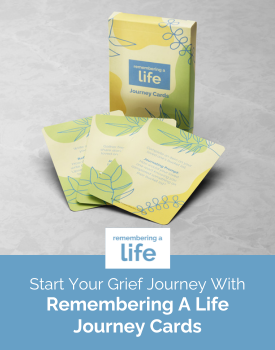Determining Your Child's Final Resting Place
You may find that choosing between cremation or burial may be one of the most difficult decisions you will need to make for your child. Determining your child’s final resting place is a very personal decision, involving family tradition, cultural and faith practices, and personal beliefs. Consider your ties to your community, what your parenting instinct tells you, and what your self-care requires. Whatever you decide is the right answer.
Selecting Burial for Your Chid's Body
Traditional burial, as a means of final rest, is an option whether you decide to place your child’s body in a burial casket or choose to have your child’s body cremated. Burial generally involves placing the casket or urn in an outer burial container, such as a burial vault, which will then be placed in the ground and covered with earth.
The grave is often marked with a headstone or other type of memorial marker that is typically designed and placed well after the funeral events are complete. The timing of this placement may depend on religious rituals, cemetery regulations, and manufacturing time. These memorial markers come in a range of sizes, colors, materials, and prices. You might opt to follow religious customs for the engraving, or you may select a short phrase, or special image along with your child’s name, birth date, and date of death to include to honor your child. Be sure to check burial site requirements before purchasing a memorial marker.
Your funeral director will be able to connect you with cemeteries or burial sites. Ask if there are donated grave spaces or special areas designated for infants and children. When selecting a burial site, ask about specific guidelines regarding placement of items and requirements for maintaining the grave space.
Selecting Cremation for Your Child's Body
If you choose cremation as a means of final rest, you will still have the option of having a memorial event, such as a “traditional” funeral or celebration of life, with your child’s body present, if you desire. You can also plan a memorial service after the cremation has taken place, and, if you wish, have your child’s cremated remains present.
Cremations are performed individually either in your selected funeral home or at a nearby cremation center. Some parents choose to be present, or have a family member present, during the cremation process.
After the cremation, your child’s cremated remains will be returned to you in an urn you will have selected. You may bury the urn or place it in an indoor or outdoor mausoleum; create keepsakes that include the remains; keep the urn in your home or other special location; or, abiding by local laws, scatter your child’s cremated remains in a place that is meaningful to you and your family. Talk with your funeral director about your options.
Thoughts, Notes & Feelings
How or where might I feel most connected to my child after their body is no longer with me?
“We had the chance to spend some time with Sam at the funeral home before the cremation. We both brought a letter to him to cremate with him and a lock of our own hair to place in each hand. He also had his special toy with him in the end.”
—Sam’s Dad
“We purchased a white casket and handed out Sharpies and stickers for his friends to decorate it. We didn’t want this to be scary for them but a time to say goodbye to their good friend.”
—Keegan & Tierney’s Mom
Selelcting Caskets, Urns & Keepsakes
Selecting among caskets, urns, and keepsakes designed specifically for infants and children is extremely personal and can be difficult to think about. These items will come in varying materials, colors, price points, and styles. You can benefit from the ideas and experience of other parents by searching online for inspiration and ideas to share with your funeral director.
You might find inspiration on social media idea boards, by reaching out to local support groups, or asking a trusted healthcare provider.
What is Your Preferred Style?
Are you interested in items that speak to your child’s personality and age (a teddy bear-shaped urn or casket with a superhero on it, for example)? Or are more “traditional” items what you’re looking for?
More Expensive Does Not Equal More Love
Your first instincts may be to assume that higher-priced items are a better choice or that you need to “do everything” to honor your child’s life. There are endless choices and many beautiful traditions. Remember that the cost of a funeral does not reflect your love for your child. Planning a thoughtful, caring tribute that honors your child’s life will help carry you forward.
